By Abena Sankofa Imhotep
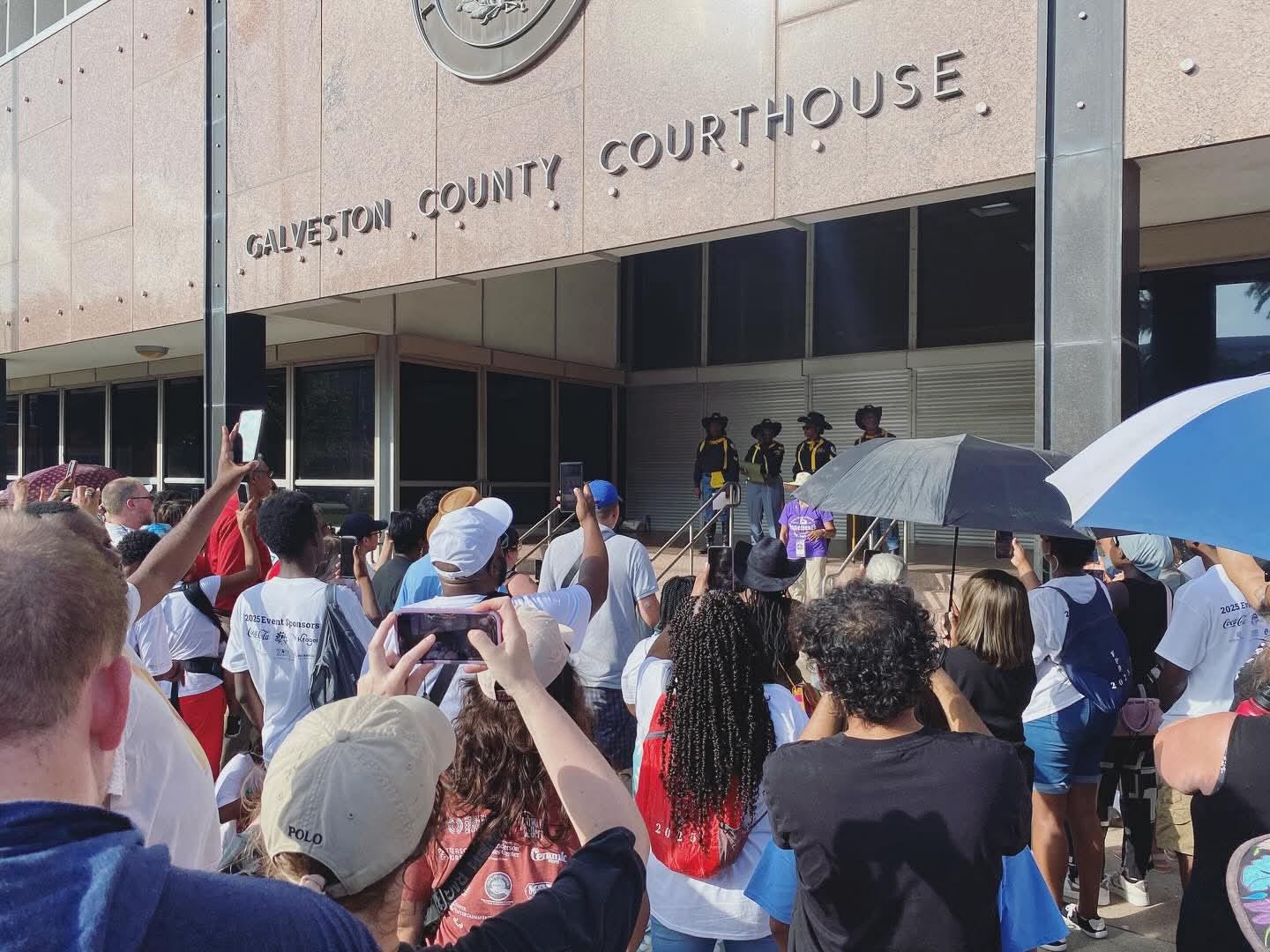
To understand Juneteenth, you have to understand Galveston.
A literal island, floating off the Texas coast: connected now by a causeway, but once reachable only by ferry.
It wasn't the biggest slave port—that was Charleston, South Carolina. But it was a key site, particularly west of New Orleans, in the domestic slave trade, and a cotton powerhouse where Black people were bought and sold in the shadows of warehouses. Walk the Strand and many of those warehouses are still standing today. Empty. Haunting.
The Moody Mansion, owned by one of Galveston’s wealthiest post-slavery families, looms in brick and legacy. But long before the Moodys built their empire, this city was already a ledger of labor stolen and lives unaccounted for.
In 2016, Queen Mother Opal Lee, the Grandmother of Juneteenth," walked from Fort Worth to D.C. at 89 years old to push Juneteenth into national recognition.
Mother Opal’s walk and advocacy emerged from deep memory of lived injustice: her own family’s home was burned down by a white mob when she was 12. Mother Opal’s activism demands that the United States tells the whole story, not just the parts it finds palatable. She said it best:
"...we need to start teaching the truth."
Truth #1:
America loves a good story—but it hates a balanced ledger.
The debts to enslaved Black people were never been paid. The labor was stolen. The land was never returned. And the interest? It’s still compounding. Juneteenth is a line item on a balance sheet this country keeps pretending it doesn’t owe.
When some 2,000 Black Union soldiers arrived on Galveston Island on June 19, 1865 with the announcement that slavery was over, it wasn’t news. It was the news Texas had withheld. Enslaved Black people in Texas had already been technically "free" for two and a half years.
Nobody told them.
That’s Juneteenth.
That’s Galveston.
That’s America.
By this design is how the United States has handled Black freedom: announce it, delay it, distort it, then ask Black people to celebrate anyway.
“Juneteenth is Texas.” -Annette Gordon-Reed
In On Juneteenth, historian and Texas native Annette Gordon-Reed tells the truth with both a scalpel and affection: Juneteenth is a contradiction. It’s emancipation and erasure. It’s Black Texans claiming space in a state that preferred they remain invisible.
And yet, claim it they did. With fish fries, freedom songs, red soda water, and folded chairs pulled up under trees on land they didn’t own.
Withholding information, delaying the truth, is a form of control.
Juneteenth causes us to confront the notion that freedom, alone, is not enough. Free people must be informed, organized, and unapologetically connected.
And Then Beyoncé Returned to Texas
Enter Cowboy Carter. The social structure has curated Beyoncé as having released a genre-bending country album. Yes, and what actually transpired was Sankofa. A return. A history lesson, a reclamation, and a shot across the bow.
Country music is not new to Black people. We've always been here. From the banjo born in West Africa to the harmonies of field songs that became blues, then gospel, then rock, then country, the "soul" sound has never needed permission or reward.
So when Beyoncé sings, “My family lived and died in America, good ol' USA, whole lotta red in that white and blue, history can't be erased,” she’s not asking for a seat. She’s reminding the world it’s sitting in our house.
That’s Juneteenth, too. The facts and the flavor. The record and the reckoning. It’s what happens when Black folks exert critical refusal to be erased from the landscapes we built.
Diaspora As a Reality
Juneteenth might be born of Texas soil, but its story, like Black identity, stretches far beyond any geographical lines.
We’ve seen the same strategy play out in Haiti, in Congo, in Palestine, in the favelas of Brazil, in the classrooms of Chicago, on the streets of Los Angeles.
Withhold. Delay. Displacement. Then demands for decorum.
If we know what it feels like to be overpoliced, underfed, miseducated, or made to prove our humanity, then we know enough to stand beside each other without condition.
Truth #2:
Freedom in America is often selectively granted, delayed, and politicized.
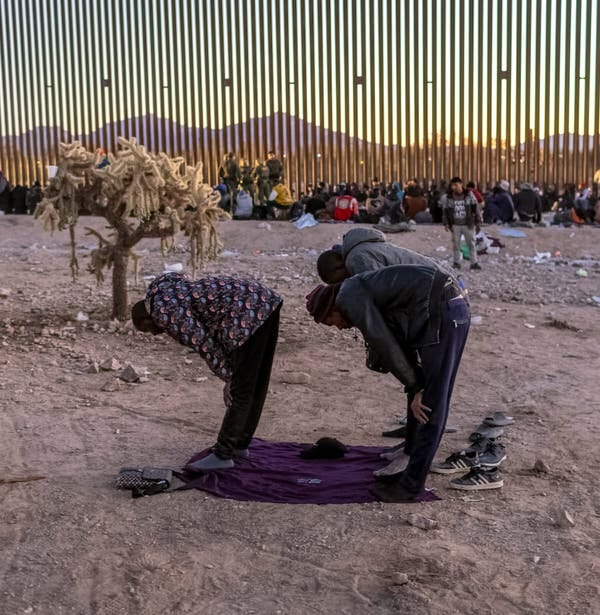
And nowhere is that more apparent today than in U.S. immigration policy.
Washington's current anti-immigration stance, has targeted Black people across the globe. Entire African nations were placed on no-entry lists. Families were separated. Asylum was criminalized.
The same country that kept freedom from Black Texans in 1865 is now doing it on an international scale by restricting who gets to move freely, delaying protection under the law and deciding whose suffering counts, and whose doesn’t.
The systems that kept our ancestors in bondage now keep our siblings in detention centers.
Freedom that only extends to national borders, or to certain skin tones, or to people whose suffering is politically convenient, is not freedom at all.
Meanwhile, the Land Is on Clearance
While we’re fighting for loan forgiveness, voting access, and dignity in healthcare, Republicans are quietly working to auction off public lands held by BLM. Not Black Lives Matter, but the other BLM. The Bureau of Land Management (BLM), the actual agency responsible for over 245 million acres of federal land.
These lands, worth billions, are part of the national commons. But guess who’s not being invited to the table?
Descendants of enslaved people. Indigenous nations. Black farmers. Dispossessed families.
Truth #3:
A serious convening about reparative strategy starts with the dirt. Because land is territory. It’s food security. It’s housing. It’s wealth. It’s autonomy.
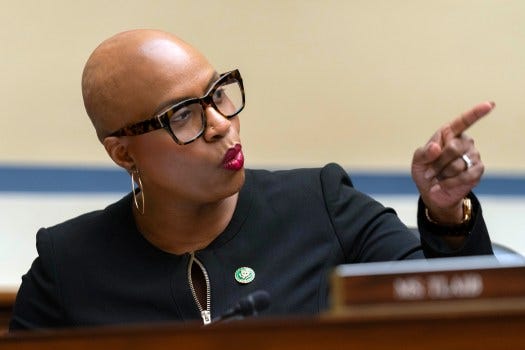
Let’s not get it twisted: This land was supposed to be part of the long-ago reparations agreement. Forty acres and a mule wasn’t poetic license—it was a military directive, later revoked. The federal government reneged on that promise is now selling the land to oil companies, real estate developers, and industrial agriculture.
This administration is not just selling property. They’re putting the evidence of broken promises up for the highest bidder.
Receipts, Not Refunds
Is there a bright side?
Yes, and it’s not just sugar in the red drink.
The bright side is us. The fact that we are continuing the struggle, telling the truth, raising free Black children in a world that tried to write us out. That our stories are no longer just whispered around the dinner table: they’re on stages, in classrooms, in books, and in legislation we’re pushing into existence.
The bright side is Black farmers reclaiming land against impossible odds. Young people who know what Juneteenth is without needing to be taught by a whitewashed textbook. Beyoncé doing genre correction in real time, reminding us that our cultural contributions are borderless and timeless. People across the diaspora finding each other, not just online, but in solidarity movements, cooperatives, and cultural exchanges.
The bright side is that truth is accessible. And even when attempts are made to erase it, we, living testimonies of a common historical truth, are accessible to each other.
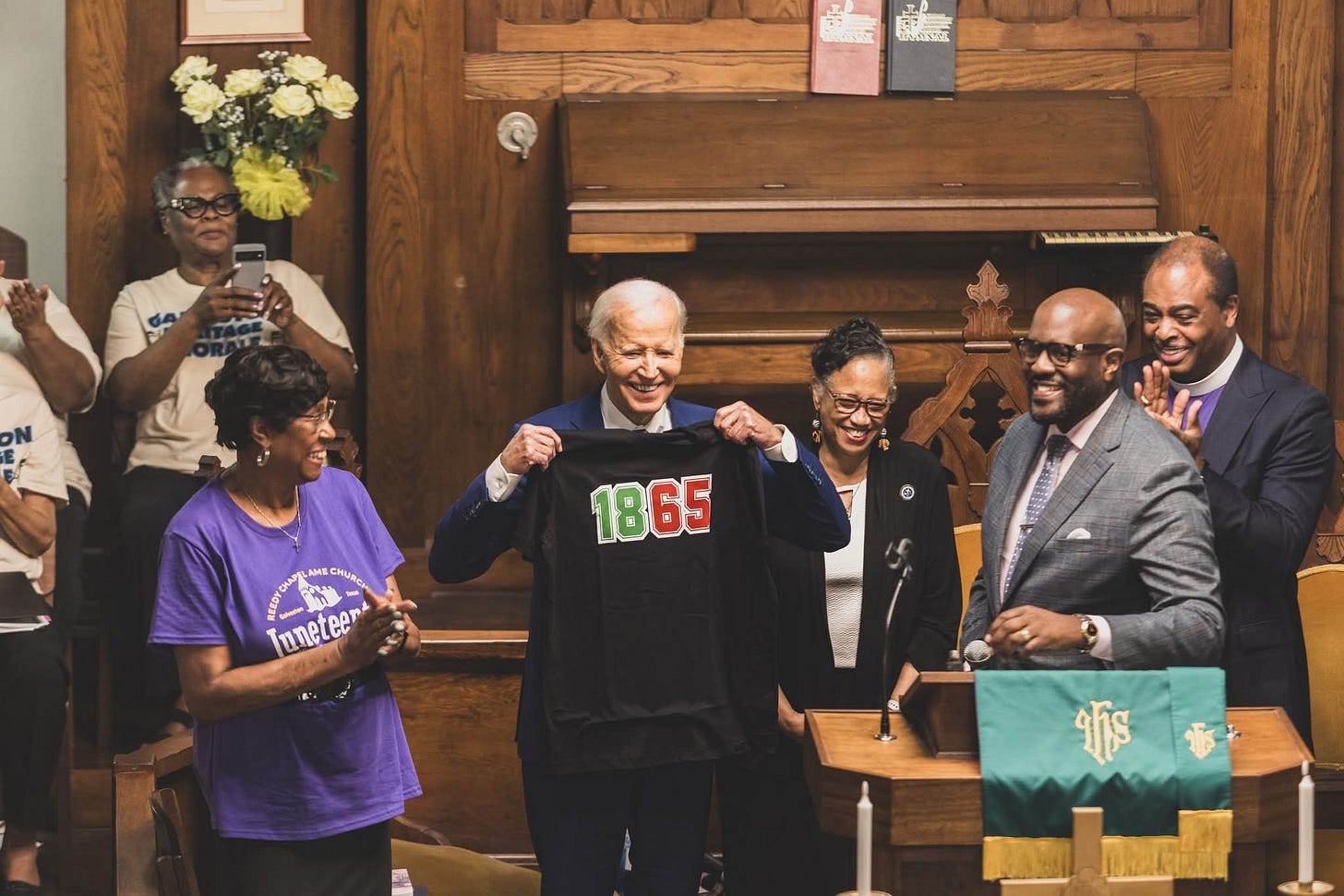
Celebrate how you choose. Grill the ribs, pour the red drink, play Cowboy Carter loud. But while we do that, let’s also:
Speak the names of the freedom fighters who are not in textbooks.
Discuss what was promised and what was taken.
Stay sharp about who still benefits and who is harmed.
Because when the truth is late, our memory must be early. And long. And lasting.
Abena Sankofa Imhotep is the founder of Sankofa Literary & Empowerment Group, host of Black & Privileged in America Podcast, and a member of the Iowa Writers' Collaborative.
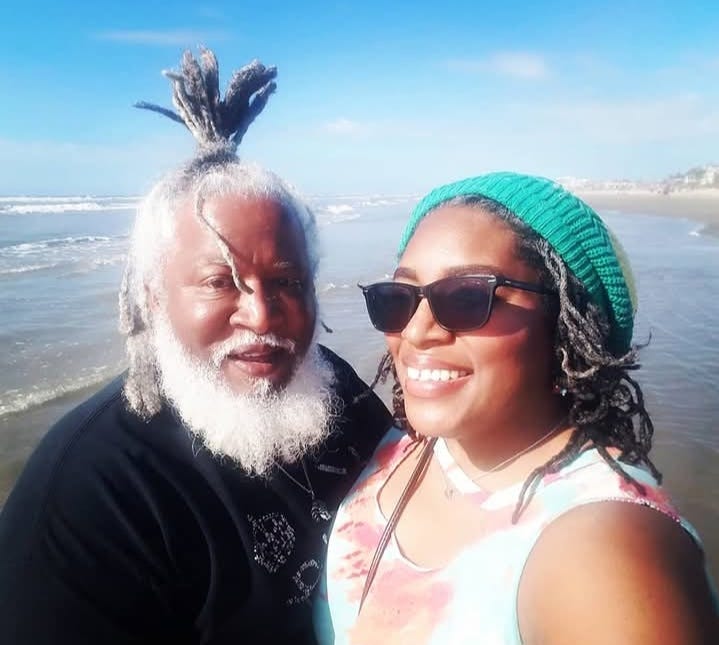
Learn more at www.abenasankofa.com.




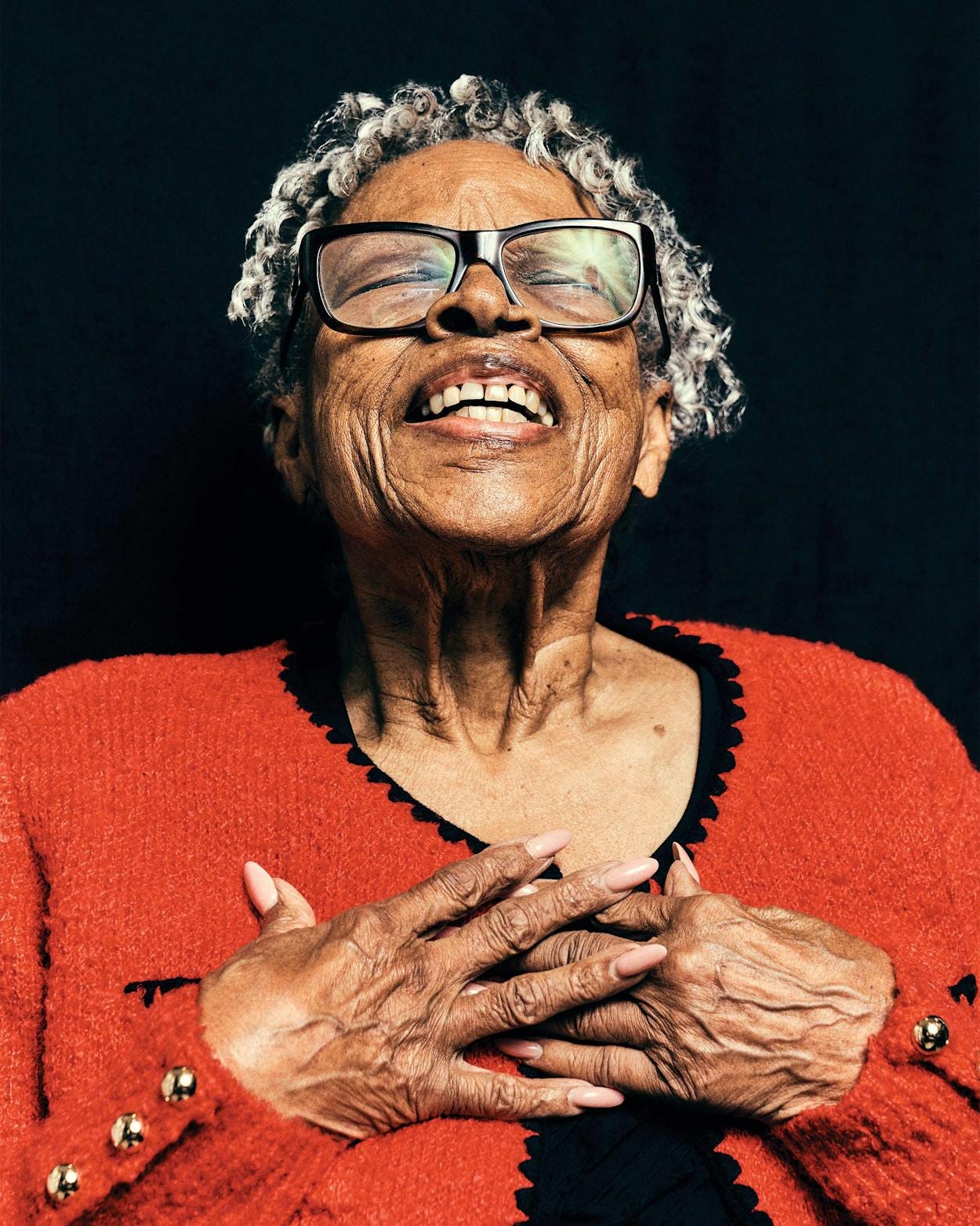
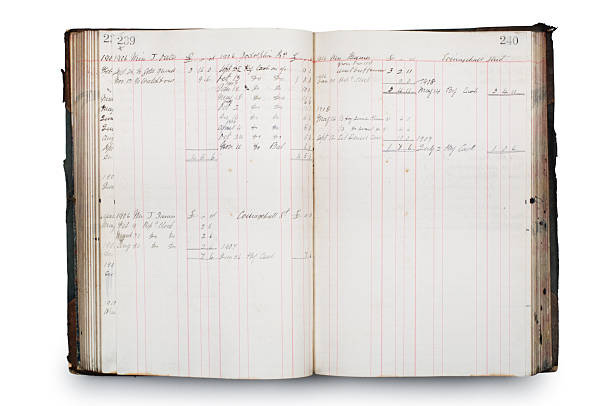
Because when the truth is late, our memory must be early. And long. And lasting
Everything I’ve read and learned about Juneteenth has either angered, offended or saddened me. This was the first story which imbued the sense of resilience, dignity and courage which proudly proclaimed that this injustice hasn’t been forgotten. Instead it’s a newly released chapter in history still being written . Thank you for the reminder.